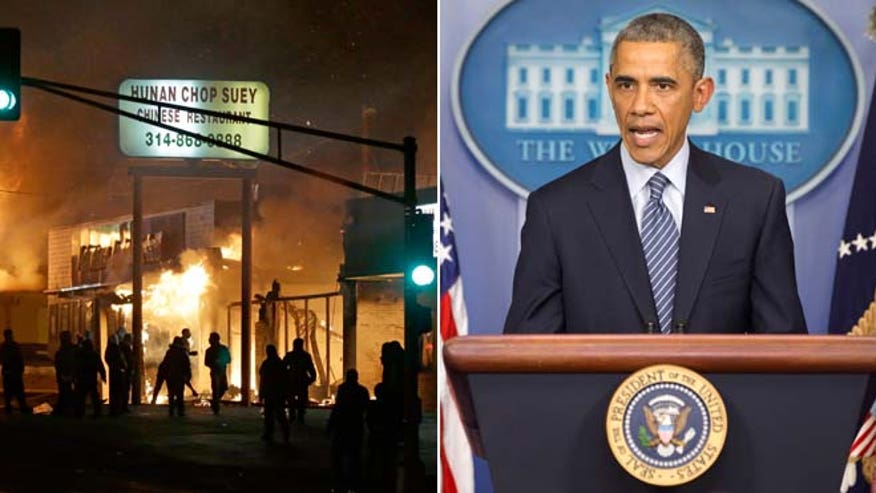
That, with Obama, a black man became president for the first time was a milestone in the fight for equality. Yet there are still many problems to solve.
It was no easy speech for Obama. As president of the United States, he could only, with difficulty, agree with the basic legitimacy of the grand jury decision in the state of Missouri. The decision not to indict the white policeman who shot the unarmed black youth Michael Brown in Ferguson was made within the justice system of the U.S. The decision was made within the rules that ultimately made Obama president, which he is supposed to follow meticulously in his position. “We have to accept this decision was the grand jury’s to make,” Obama said, but not without alluding to “broader challenges that we still face as a nation.”
Fearful of putting off white voters, the president, up to now, has largely avoided making the problems of black people in the U.S. a topic of discussion. He guarded against taking any one side in situations like the fatal shooting in Ferguson. In doing so, he has disappointed many of his constituents in the black community. More than a few of them hoped that, with him in the office of president, they would have a direct advocate for their issues. They had anticipated that the slogans of “hope” and “change,” with which Obama entered the election campaign in 2008, in fact meant a new hope for a positive change in the condition of many underprivileged black people in the U.S.
That, with Obama, there is for the first time a black U.S. president proves that much has changed in a country in which, as recently as the 1960s, black people were legally degraded to second-class human beings in several states because of their dark skin. After Colin Powell and Condoleezza Rice occupied high-ranking offices in the Bush administration, Obama’s election to president demonstrated that the highest office in the land was no longer inaccessible to African Americans — a milestone in the arduous journey of a long-oppressed segment of the population toward greater equality.
However, despite this positive change, much has yet to be addressed. Racism is still a problem in the U.S. It ranges from ideologically characterized fantasies of superiority of some white crackpots to all kinds of everyday racism. Black people are stopped by police disproportionately more often than white people. Anyone with dark skin wearing a hoodie is instantly inherently suspicious. Segments of the African American community are still caught in a vicious cycle of discrimination, poor education, poverty and crime, which reinforces the stereotype of the “dangerous, criminal black.”
The case of Ferguson precisely shows how virulent these questions still are. The wave of violence that is now overpowering the small town, including the burning of houses, can in no way be justified. It is, however, a symptom of deep-seated problems. Regardless of the exact circumstances of the fatal shooting of Michael Brown and the reasons for which the grand jury made its decision, the fact that so many citizens are enraged and getting together in peaceful protests bears witness to their deep mistrust of the system of justice. The system, in their opinion, is unfair, in that it appears to protect (white) policemen in excess and (black) citizens too little.
A society in which certain segments — however justly or unjustly — feel discriminated against and excluded has a problem. And it is necessary to solve this problem for the well-being of the general public. At the beginning of his term of office, Obama said there was no black and no white America; there was only the United States of America. Even if he is the best example that much has changed for the positive, there is still a lot of work to be done toward the fulfillment of this vision.

I am a citizen of the United States and a registered Democrat( more a democratic Socialist) in the beautiful state of Rhode Island. Outraged by the Ferguson decision, many blacks here-and their white and latino supporters – on the day after, blocked interstate Route 95 for nearly an hour. It was all rather foolish, I think. But it shows that alienation in American capitalist society is reaching a breaking point among the nation’s have-nots. For too long Neo-Democrat inspired ” political correctness ” has racialized POVERTY IN AMERICA. I can’t imagine a million homeless white people IDENTIFYING with our ONE PERCENT ruling class in common hostility to ” lawless and rioting ” black people. The vast majority of white people are just unpretentious working class people who create the wealth and fight the foolish wars of our ruling class. They know how the MAJESTIC LAW swindles the common people.
I am by disposition a believer in non-violent social change. But I wonder if the assassinated firebrand black revolutionary Malcolm X is more relevant today to Afro-Americans than Martin Luther King. Malcolm’s last year alive is very interesting to left-wing scholars. He was invited to speak before enthusiastic liberal audiences, mostly radicalized white students. ” Show me a capitalist “, Malcolm said passionately, ” and I’ll show you a bloodsucker ! ” .
Will Washington D.C. soon look like Cairo, Egypt in 2011 ?
Well, to be sure, History has not ended. PEACE !
http://radicalrons.blogspot.com/